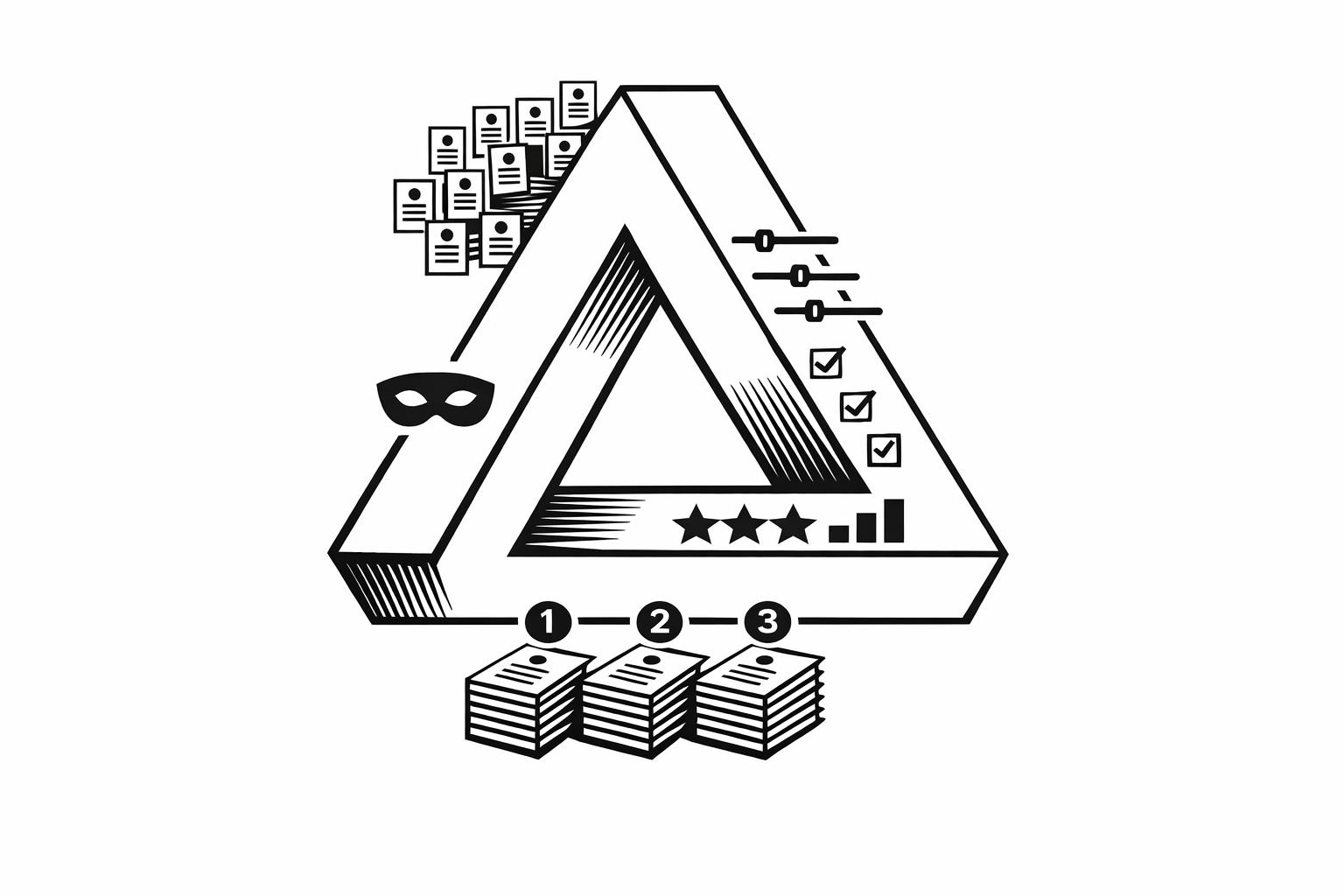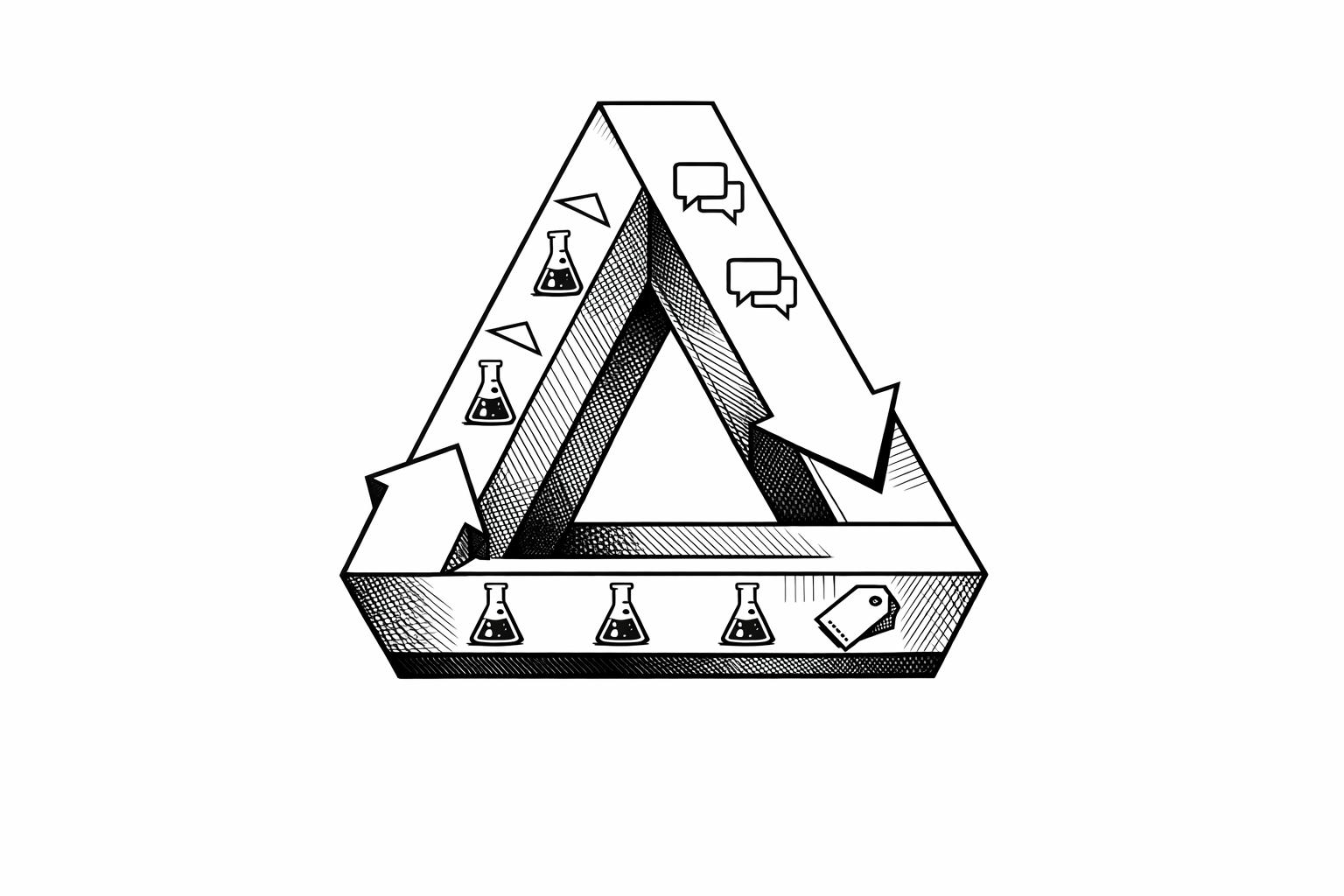AI Workflow Automation Platforms: Comparison 2026

AI is transforming how businesses operate, with 61% of organizations already using it to automate workflows. By 2026, the global AI market is expected to reach $190 billion, growing at 33.8% annually. Companies adopting AI automation report benefits like a 40% productivity boost, 20-30% cost savings, and fewer manual errors. However, choosing the right platform is critical to success.
Here’s a quick look at seven top AI workflow automation platforms for 2025:
- Vellum AI: Focuses on enterprise-scale AI workflows with advanced monitoring and evaluation tools.
- Gumloop: A no-code platform with visual builders for easy automation.
- Lindy.ai: Natural language-based automation for intuitive task management.
- n8n: Open-source, self-hosted platform offering customization and control.
- Zapier: Known for its wide integrations and user-friendly interface.
- Relay.app: Combines automation with human input for team collaboration.
- Relevance AI: Ideal for data-driven businesses with analytics and vector search.
Each platform offers unique features, pricing models, and scalability options. Vellum AI and Relevance AI cater to enterprise needs, while Zapier and Gumloop are great for smaller teams or non-technical users. n8n provides full control for tech-savvy businesses, and Relay.app excels in collaborative workflows.
For businesses looking to optimize their automation strategies, platforms should be matched to specific needs, budgets, and technical expertise. Below is a quick comparison to help you decide.
Quick Comparison
| Platform | Scalability | Key Features | Pricing Model | Security Level |
|---|---|---|---|---|
| Vellum AI | High | AI workflow orchestration | Custom quotes | Enterprise-grade |
| Gumloop | Medium to High | No-code, visual builders | Credit-based | Standard encryption |
| Lindy.ai | Medium | Natural language automation | Usage-based | Standard security |
| n8n | Very High | Open-source, self-hosted | Free/paid tiers | Customizable |
| Zapier | High | 8,000+ app integrations | Task-based | SOC 2/GDPR compliant |
| Relay.app | Medium | Human-in-the-loop workflows | Seat-based | Business-grade |
| Relevance AI | Very High | Analytics, vector search | Credit-based | Enterprise compliance |
The right choice depends on your goals: Vellum AI is ideal for optimizing AI models, Zapier handles broad integrations, n8n offers flexibility, and Relevance AI is perfect for data-heavy operations. Pairing the right platform with effective prompt engineering can maximize ROI and streamline workflows.
Best AI Automation Platform 2025: Agency Owner's Pick
1. Vellum AI
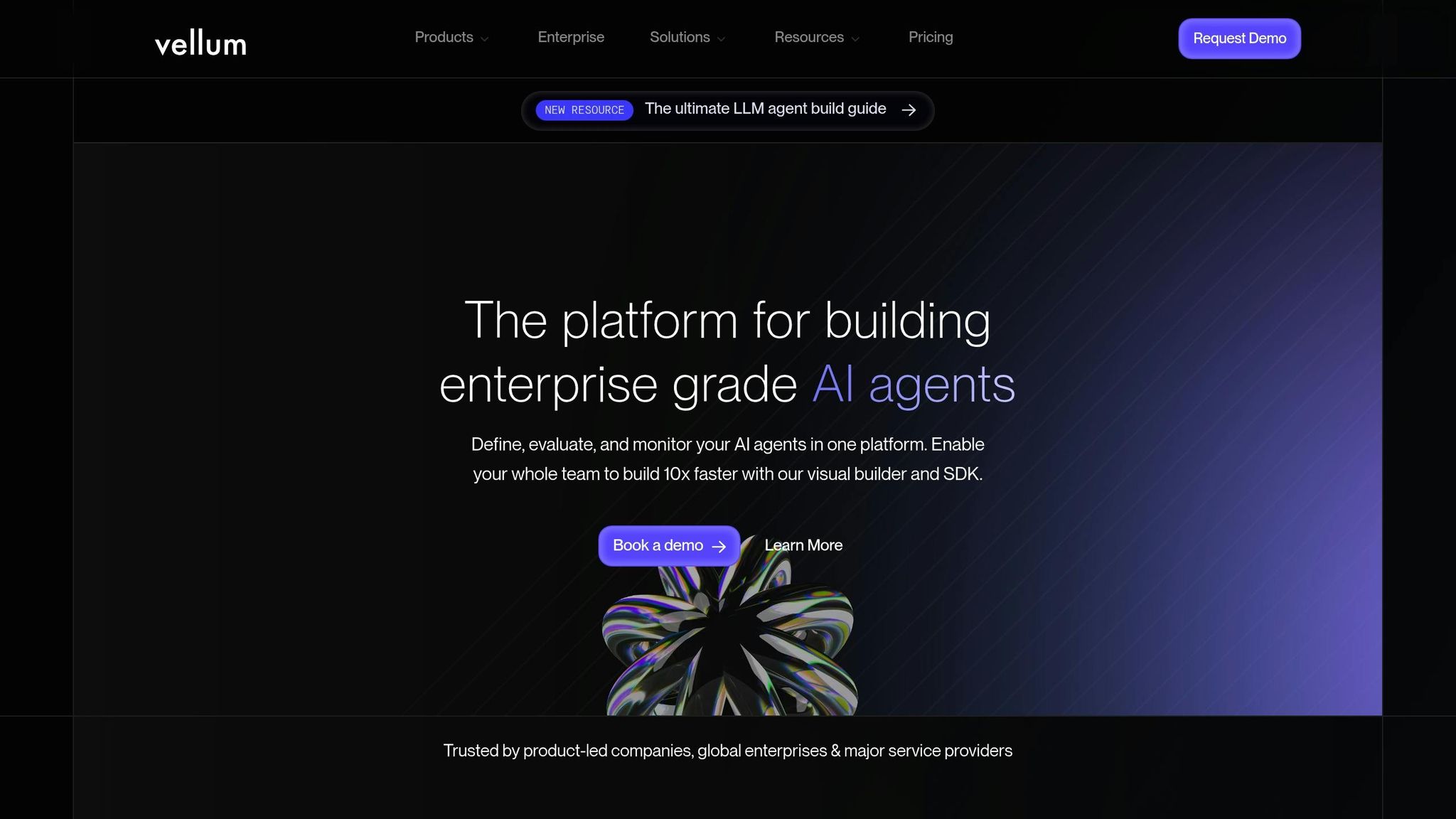
Vellum AI is a specialized workflow platform designed specifically for enterprises looking to streamline the development, evaluation, and monitoring of AI agents and automations. Unlike generic automation tools, Vellum focuses entirely on scaling AI operations. It bridges the gap between technical and non-technical teams, offering tools like visual interfaces, low-code options, and SDK-based workflow creation.
What makes Vellum stand out is its commitment to quality assurance before deployment. With built-in features for evaluations, versioning, and regression testing, teams can thoroughly assess AI agents across key metrics like cost, latency, and reliability. This ensures that everything is optimized before production begins.
Features
Vellum shines in agent orchestration and in-depth monitoring. Its platform is built for complex workflows, supporting advanced features like loops, state snapshotting, and forking. These capabilities make it possible to create reproducible, automated systems. Users can also create custom nodes directly through the interface, export their code, and deploy custom Docker images for complete control over runtime environments.
For troubleshooting and optimization, Vellum offers detailed tools like node-level traces, graph views, and real-time logs. These help teams identify issues and spot edge cases quickly. Additionally, the platform tracks cost and latency metrics for every workflow component, providing clear insights into performance.
Vellum integrates seamlessly into existing workflows, offering support for TypeScript and Python SDKs, document retrieval, semantic search, and multiple evaluation methods.
Scalability
Designed for enterprise-scale operations, Vellum supports both cloud-based and VPC installations. It excels in handling complex, multi-step AI processes while delivering consistent performance, even for large user bases and high operational demands.
The platform’s architecture is built with enterprise needs in mind, including support for multiple workspaces and role-based access controls. This makes it ideal for organizations with diverse teams and projects. For added flexibility, Vellum provides custom contracts and enterprise-level support to ensure that growth doesn’t come at the cost of service quality or compliance.
Pricing
Vellum offers tiered pricing, allowing businesses to access features ranging from basic workflow tools to advanced integrations like custom models and enhanced security. While specific pricing details aren’t publicly listed, interested customers can book a demo for a customized quote. Pricing depends on factors like the number of users, usage volume, required features, and support levels.
Security
Security is a key focus for Vellum, especially given its enterprise clientele. The platform adheres to SOC 2 Type II standards and offers HIPAA compliance, including Business Associate Agreement support for healthcare organizations.
For additional security, Vellum provides VPC deployments, configurable data retention policies, and Single Sign-On integration. It also supports custom contracts and Data Processing Agreements to meet strict compliance requirements.
To further enhance security, Vellum integrates with external monitoring tools, enabling teams to maintain oversight of their AI workflows. This ensures that automated processes remain secure and compliant with organizational standards.
2. Gumloop
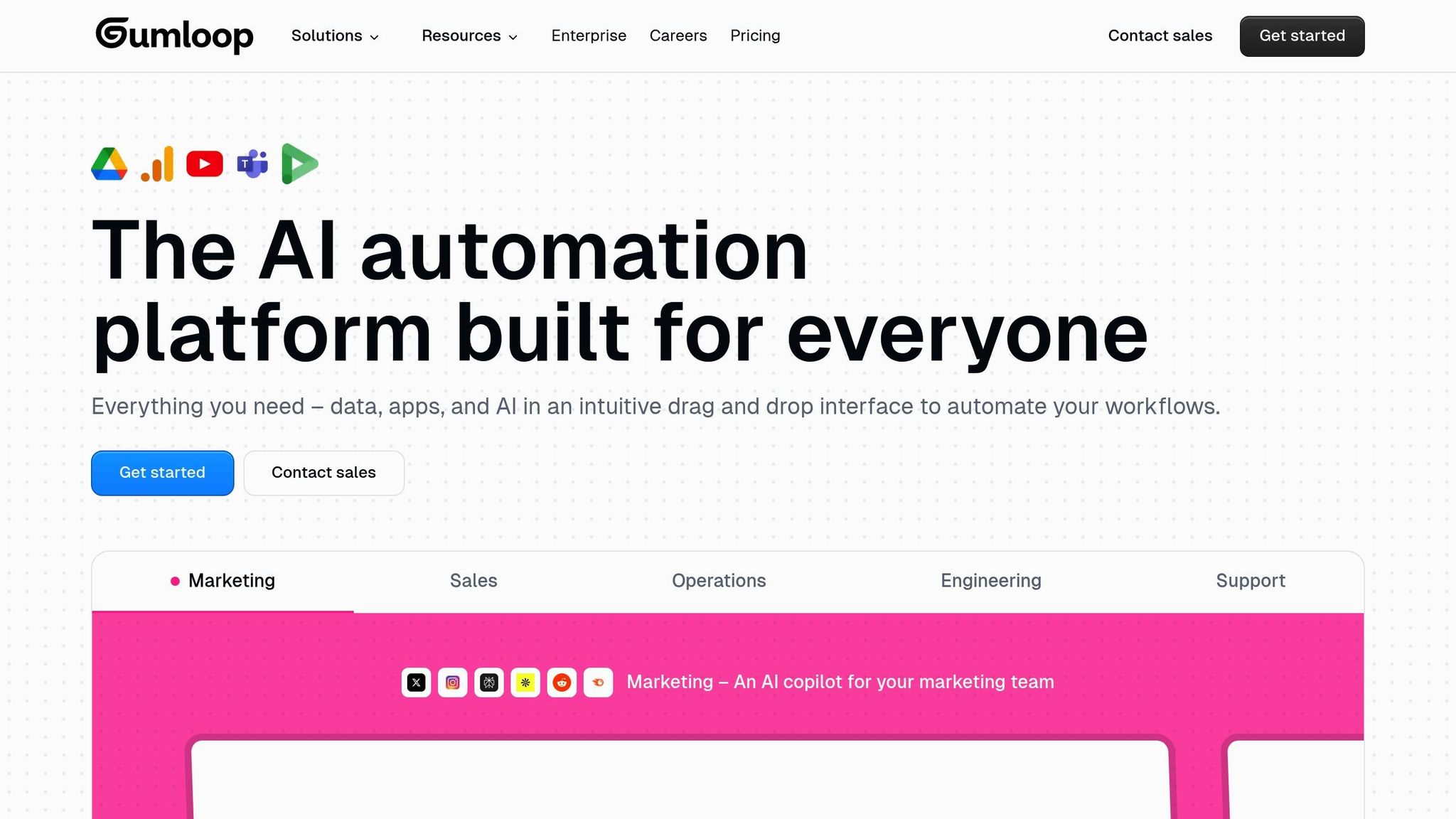
Gumloop is a no-code platform designed to make AI automation accessible to everyone on a team. By using visual workflow builders and drag-and-drop tools, it simplifies complex AI processes. This approach allows teams without technical expertise to create automated workflows while still offering the advanced features needed for more sophisticated tasks.
The platform has become popular with businesses looking to streamline automation. David Phelps, VP at Albert, highlighted its impact on productivity:
"With Gumloop, any team member can now identify a manual process and turn it into an automated workflow without writing a single line of code."
Gumloop's credit-based usage model and intuitive workflow creation tools make it ideal for companies aiming to scale automation without heavy reliance on developers.
Features
At its core, Gumloop offers a visual workflow builder that supports unlimited nodes and flows across all pricing tiers. Key automation features include web scraping, data enrichment, and AI model integrations. The platform’s drag-and-drop interface, combined with its AI assistant, Gummie Agent, enables users to design and refine workflows without needing coding skills.
Gumloop also supports real-time integrations through webhooks and allows users to integrate their own API keys. For team collaboration, the platform provides unlimited workspaces, unified billing, and tools like team usage analytics and Slack support. It tracks workflow performance and credit usage, giving teams insights to manage automation costs effectively.
Advanced features include concurrent run capabilities, which scale based on the pricing tier. For example, the Free plan allows 2 concurrent workflows, while the Team plan supports up to 5. This feature ensures workflows can run simultaneously, boosting efficiency for growing teams.
Scalability
Gumloop uses a credit-based model that adjusts to the complexity of tasks. For instance, standard AI calls cost 2 credits, while advanced calls, such as those using GPT-4.1 or Claude Sonnet 3.7, require 20 credits. Credits are also deducted for flow runs, web scraping, and data enrichment steps.
Concurrent run limits further define scalability. Free users can handle 2 workflows at once, Solo users get up to 4, and Team users can manage 5. For larger operations, the Enterprise tier offers custom options, such as Role Based Access Control, SCIM/SAML Support, and Virtual Private Cloud deployments. These features ensure compliance and security as automation needs grow.
Pricing
Gumloop’s pricing is based on a monthly credit system that caters to a wide audience, from individual users to large enterprises:
- Free: $0/month, includes 2,000 credits, 1 seat, 1 active trigger, and 2 concurrent runs.
- Solo: Starting at $37/month, offers 10,000+ credits, unlimited triggers, 4 concurrent runs, and the ability to integrate your own API keys.
- Team: From $244/month, provides 60,000+ credits for 10 seats, 5 concurrent runs, unlimited workspaces, unified billing, and Slack support.
- Enterprise: Custom pricing with advanced security features, audit logs, and data retention controls.
Plans renew monthly, and no annual discount options are advertised.
Security
For organizations requiring strong security measures, Gumloop’s Enterprise tier delivers features like SCIM/SAML Support for identity management and Role Based Access Control to manage user permissions effectively.
The platform also includes audit logs to track user actions and workflow executions, aiding in compliance and security monitoring. Custom data retention policies allow businesses to control how long workflow data is stored.
For sensitive operations, Gumloop supports Virtual Private Cloud deployments and an incognito mode. Administrators can also restrict access to specific AI models through the AI Model Access Control feature, balancing costs and security. Regular security reports keep enterprise customers informed about the platform’s safety measures.
3. Lindy.ai
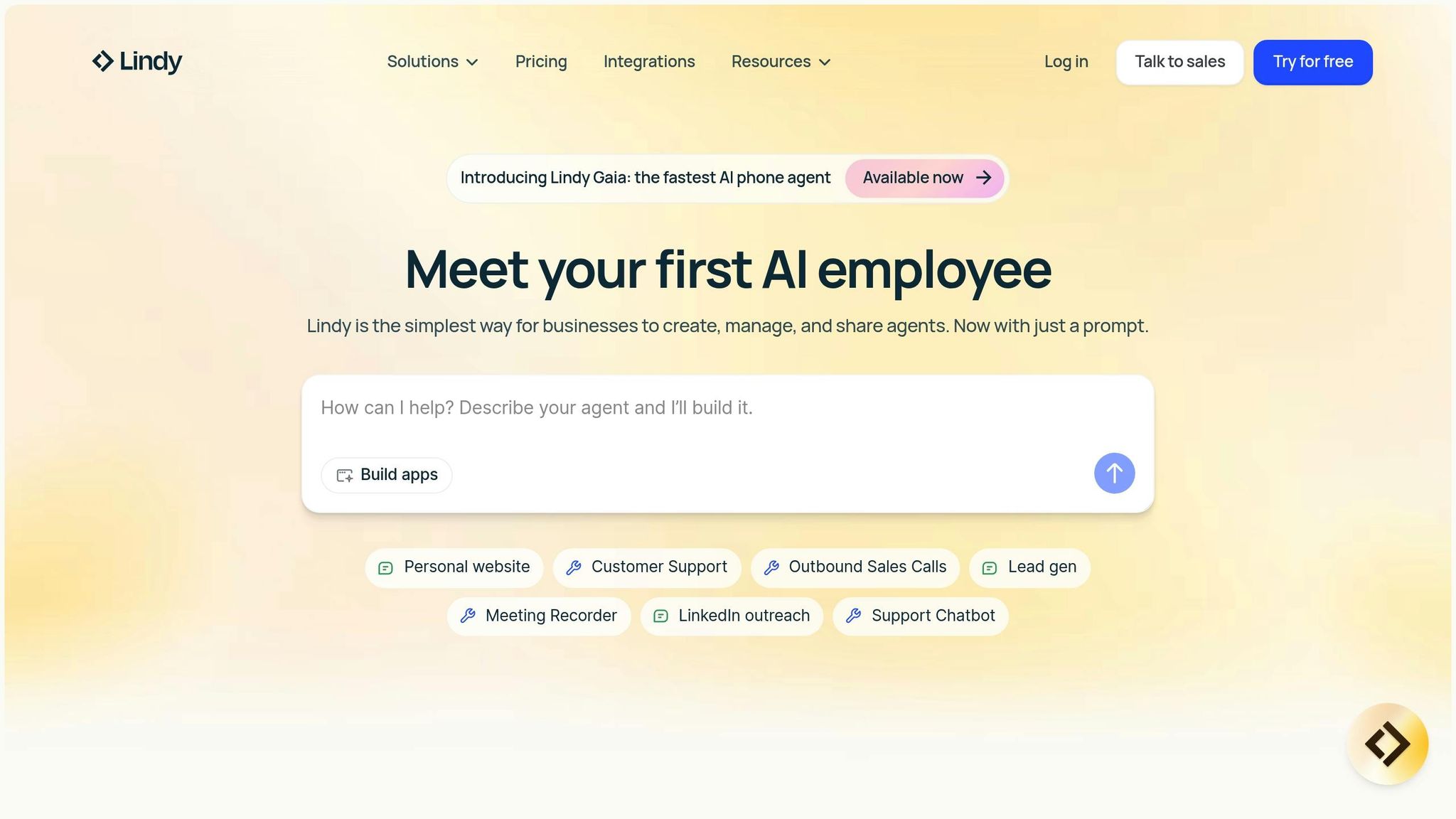
Lindy.ai is an AI-powered platform designed to streamline workflow automation. Instead of relying on traditional visual workflow tools, it allows users to describe their desired outcomes using natural language. This makes automating multi-step tasks simpler and more intuitive.
Features
Lindy.ai leverages natural language processing to enable seamless conversational interactions. It supports various input types, including text, images, and documents, and integrates easily with existing tools and databases. The platform also learns from user interactions over time, refining how tasks are executed and improving collaboration across teams.
Scalability
Thanks to its agent-based architecture, Lindy.ai is built to handle growing workloads. It dynamically allocates resources, adjusting computational power to match the complexity and volume of tasks. This ensures the platform performs efficiently, even as demands increase.
Pricing
Lindy.ai offers a usage-based pricing structure with tiered plans tailored for individuals, professionals, and enterprises.
Security
Security is a key focus for Lindy.ai. The platform includes advanced encryption and strict access controls. For organizations with heightened security needs, options like on-premises or private cloud deployments are available, providing greater control over sensitive data.
4. n8n
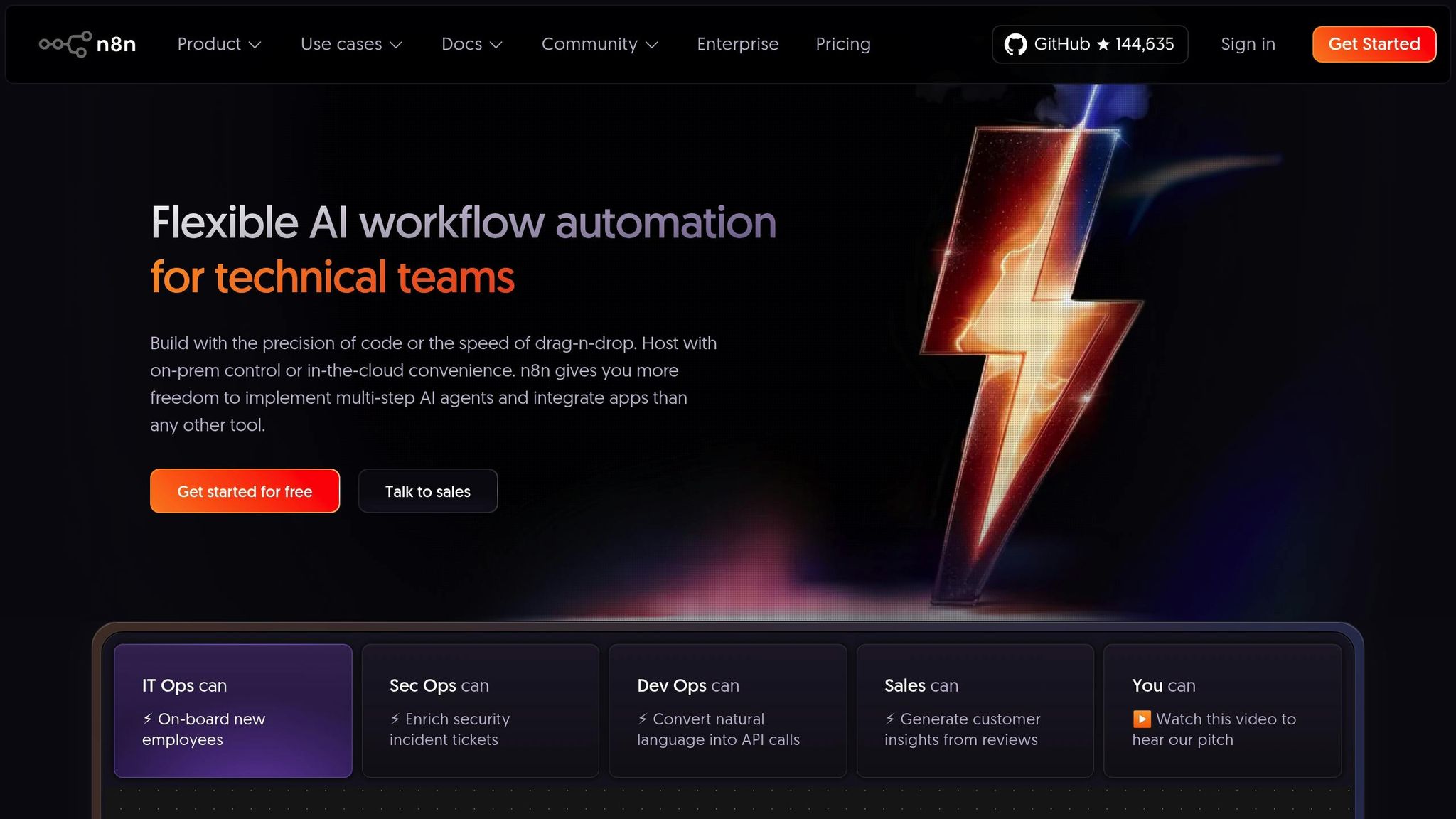
n8n is an open-source platform designed for workflow automation. It supports on-premises or private cloud setups, giving businesses complete control over their data and compliance requirements.
Features
n8n comes with a user-friendly drag-and-drop visual editor that makes connecting services straightforward. It integrates with a wide range of popular business tools and databases, while also allowing custom JavaScript functions for situations where pre-built nodes don't meet specific needs. The platform supports real-time triggers through webhooks and includes advanced features like error handling, conditional logic, and data transformation, enabling the creation of complex automation workflows.
Scalability
To handle enterprise-level demands, n8n uses a queue-based architecture for asynchronous workflow processing. It also supports horizontal scaling, distributing tasks across multiple servers. For self-hosted setups, organizations are responsible for managing load balancing and optimizing databases to maintain peak performance.
Pricing
n8n offers a freemium self-hosted option that includes unlimited workflows and executions. For those who prefer a managed service, n8n provides a cloud-based solution with tiered pricing plans tailored to fit teams of different sizes and enterprise requirements.
Security
Security in n8n depends heavily on the deployment method chosen. Self-hosted setups allow organizations to maintain full control over data and implement their own security measures, such as SSL encryption, OAuth authentication, and role-based access controls. Managed cloud deployments, meanwhile, take care of updates, vulnerability patches, and backups, reducing the workload for internal IT teams. This flexibility in deployment and security options makes n8n a strong choice for businesses needing reliable automation solutions.
5. Zapier
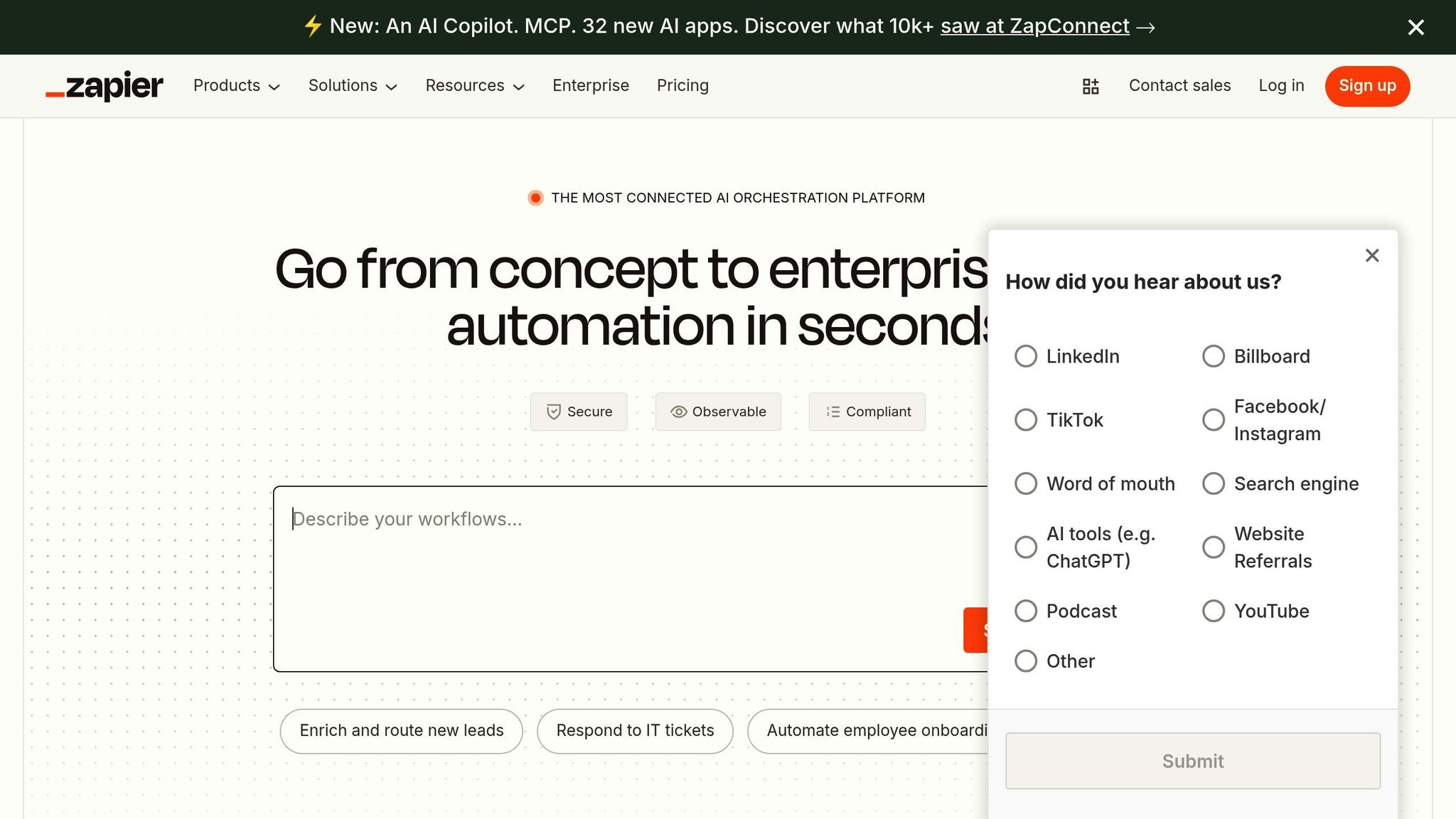
Zapier is a well-established name in the world of workflow automation, catering to 3.4 million companies globally. Designed with enterprise needs in mind, the platform offers a powerful combination of integration capabilities and scalability. Over time, Zapier has grown from a simple app connector into a sophisticated AI-driven orchestration tool suitable for both technical and non-technical users.
Features
At the heart of Zapier's AI capabilities is its assistant, Copilot. This tool makes creating workflows easier by allowing users to provide natural language instructions. Additionally, Zapier includes an "AI by Zapier" feature, enabling seamless integration with various large language models. Users can select their preferred AI provider and craft prompts with AI guidance. The platform also supports diverse input formats, including images, audio, and video.
Zapier's AI Agents add a layer of intelligent decision-making within workflows, while its chatbot capabilities streamline customer service automation. For those who prefer visual tools, the Canvas feature provides a diagram-based interface for designing workflows, incorporating AI elements to simplify complex automation processes.
With connections to over 8,000 apps, Zapier boasts one of the largest integration ecosystems. This extensive network allows businesses to embed AI into nearly any system, from productivity tools to cutting-edge AI platforms. Zapier also offers built-in tools like Tables for data storage and Interfaces for creating user-facing applications, which can both integrate AI functionality. Together, these tools ensure seamless automation for businesses of all sizes.
Scalability
Zapier's infrastructure is built to handle enterprise-scale operations. Features like outage detection, intelligent throttling, and API change management ensure reliability, even under heavy workflow demands. Its horizontally scalable architecture enables the platform to process high volumes of tasks across distributed systems.
On average, Zapier saves its users the equivalent of 282 days of manual work annually. For enterprises, the platform supports onboarding thousands of users and automating millions of tasks, all while maintaining the performance needed for global operations. This scalability makes it a trusted choice for businesses looking to automate at scale.
Pricing
Zapier uses a task-based pricing model, meaning users are charged only for completed actions, including those powered by AI. Unlike credit-based systems where internal logic can add unexpected costs, Zapier offers unlimited filtering, formatting, looping, and error handling at no additional charge.
The pricing starts with a free plan that includes 100 tasks and 5 Zaps. Paid plans range from $19.99 to $69 per month (billed annually). If users exceed their task limits, they can purchase additional tasks without needing to upgrade their entire plan. All plans come with unlimited access to Tables and Interfaces.
For larger organizations, Zapier provides custom Enterprise pricing. These plans feature annual task limits instead of monthly caps, making it easier to budget for high-volume automation. Enterprise pricing is tailored to specific needs and requires direct consultation with Zapier's sales team.
Security
Security is a priority for Zapier, which adheres to SOC 2 Type II and GDPR compliance. It offers Single Sign-On (SSO), granular permissions, and automatic updates to address vulnerabilities. Detailed audit logs are also available to monitor activity.
Enterprise customers gain access to enhanced security features, including SCIM user provisioning, custom data retention policies, and advanced admin controls. Zapier also supports deeper integrations with proprietary and internal apps through custom webhooks, ensuring compatibility with complex IT systems while maintaining robust security standards.
"The Enterprise plan enables your entire team to use Zapier, with advanced security features, governance, and monitoring features such as advanced admin permissions and custom data retention. Enterprise allows you to empower all of your employees while providing safeguards you need to protect sensitive data and critical workflows."
sbb-itb-58f115e
6. Relay.app
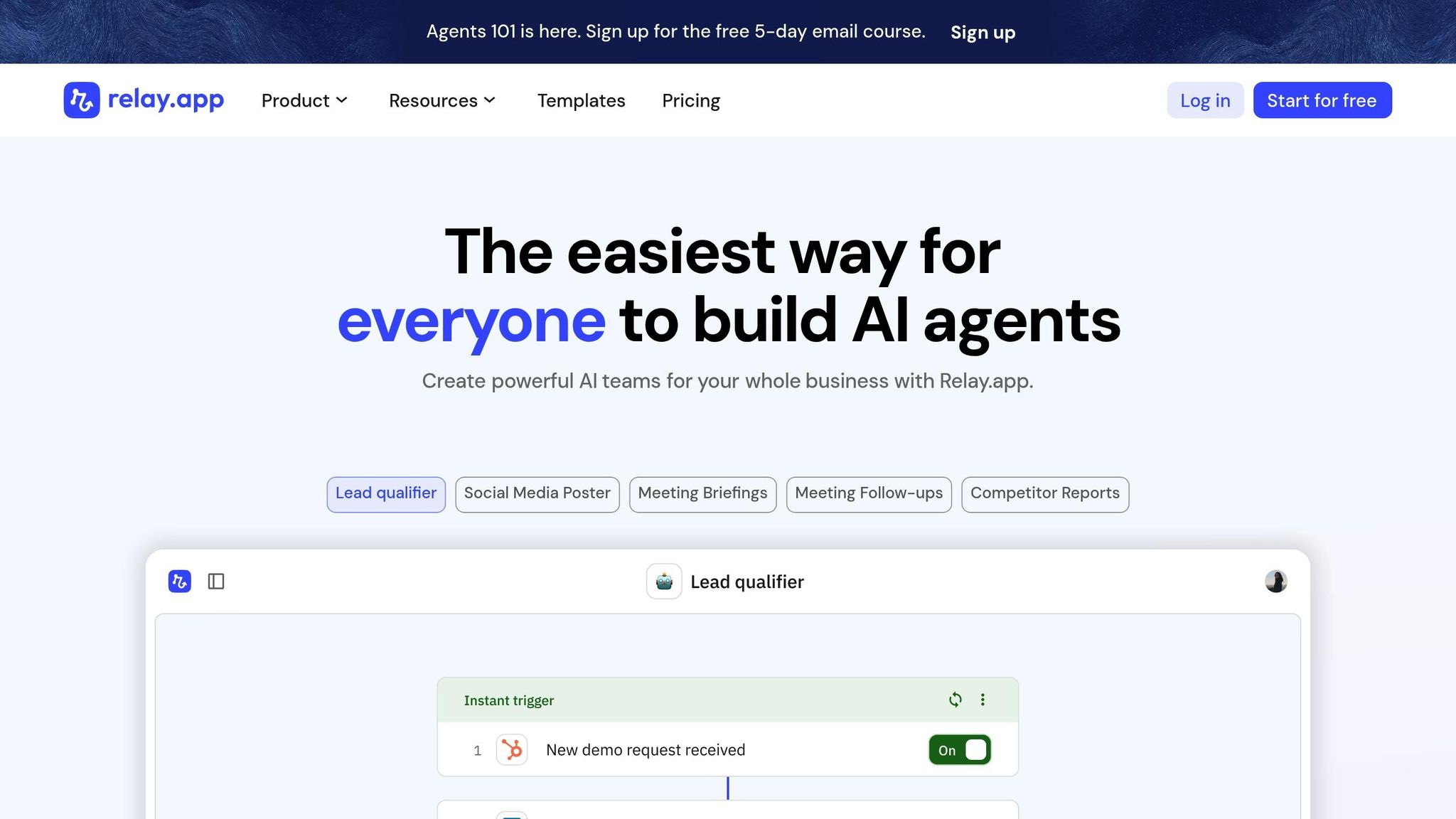
Relay.app is an automation powerhouse designed for enterprise users, blending AI, human input, and collaborative tools to streamline processes across more than 100 applications. Its approach combines efficiency with control, making it especially user-friendly for beginners and non-technical teams.
Features
One of the standout aspects of Relay.app is its Human-in-the-Loop Workflows, which incorporate checkpoints like approvals, task assignments, and data entry into automated processes. This setup ensures users can review and approve AI-generated outputs before any action is taken, giving teams confidence in their automation.
Relay.app is equipped with advanced AI capabilities for tasks such as summarization, translation, and data extraction. It also features Mini AI Agents that perform custom actions, making them perfect for tasks like customer support or lead research. The platform even supports web browsing and allows users to create custom AI prompts with structured output fields, offering flexibility for unique use cases.
The platform integrates with multiple AI models, including OpenAI's GPT (GPT-3.5, GPT-4o, GPT-4o mini, GPT-4), Google's Gemini, Anthropic's Claude, and Groq's LLaMa and Mixtral. To make things even better, every plan includes free access to GPT-4o, GPT-4o mini, and GPT-3.5 Turbo.
Its modern drag-and-drop workflow builder is a game-changer for non-technical users, enabling the creation of complex automations with ease. The platform also excels in data integration, ensuring real-time updates and smooth data handling.
Relay.app takes collaboration seriously, offering features like shared workspaces, live editing, granular permissions, and dynamic role assignments. These tools make it easy for teams to work together seamlessly, routing tasks to the right person at the right time.
Flow control options such as conditional paths, iterators, path merging, and scheduled wait steps allow for precise automation. Together, these features make Relay.app a flexible and powerful tool for businesses of all sizes.
Scalability
Relay.app is built to grow with your business. Its architecture supports over 100 applications, making it a great fit for companies with diverse integration needs. The platform handles live data updates and complex workflow logic effortlessly, ensuring reliability at scale. The Mini AI Agents feature also allows businesses to gradually adopt advanced automation, making the transition smooth and manageable.
Pricing
Relay.app's pricing reflects its flexibility and scalability. All plans include free access to popular AI models like GPT-4o, GPT-4o mini, and GPT-3.5 Turbo, helping businesses keep costs in check while leveraging cutting-edge AI tools. The pricing structure is designed to accommodate workflows involving human oversight, recognizing that processes requiring human input may differ in cost compared to fully automated ones.
7. Relevance AI
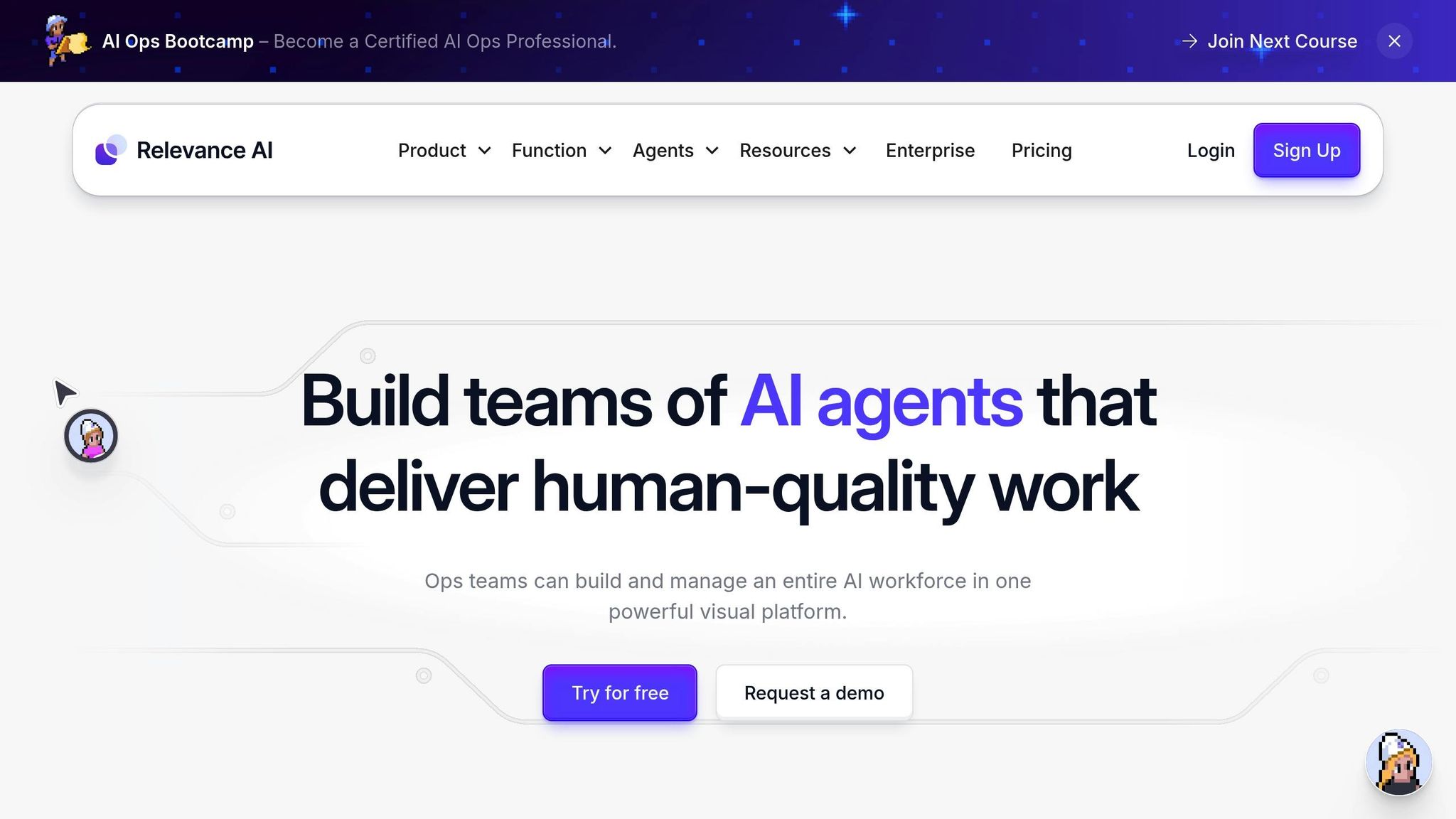
Relevance AI blends AI workflow automation with advanced analytics to help businesses create and manage AI agents capable of handling complex tasks. The platform stands out for its ability to provide deep insights into performance and outcomes, making it a powerful tool for enterprise-grade automation and data analytics.
Features
Relevance AI's AI Agent Builder empowers users to design sophisticated automation workflows without needing extensive coding skills. It supports multiple AI models, including GPT-4 and Claude, offering flexibility to create task-specific solutions tailored to various needs.
The platform excels at managing large datasets, performing sentiment analysis, and conducting semantic searches across diverse content types like documents and images. Users can integrate data from multiple sources, such as spreadsheets and APIs, and process it through customizable AI pipelines.
One standout feature is its vector search capabilities, which enable semantic searches across different content types. This is particularly useful for businesses handling large volumes of unstructured data, such as customer support automation or content management workflows.
Relevance AI also offers collaborative workspace tools, allowing teams to share workflows, monitor performance, and refine AI agents together. Detailed analytics dashboards provide insights into workflow performance, cost tracking, and usage metrics, helping businesses fine-tune their automation strategies.
The platform's no-code workflow builder features a user-friendly visual interface, making it accessible even to non-technical users. It supports conditional logic, approval processes, and integrations with popular business tools like Slack, Google Sheets, and CRM systems.
Scalability
Built for enterprise-level operations, Relevance AI features auto-scaling infrastructure and an API-first architecture that integrates seamlessly with existing systems. It can handle thousands of workflow executions simultaneously without compromising performance, making it ideal for businesses with high-volume automation needs.
Organizations can start small with basic workflows and expand to more complex, multi-step automations as their requirements grow. Role-based access and organized workspaces simplify the management of multiple automation projects, ensuring security and oversight for larger teams.
Pricing
Relevance AI uses a credit-based pricing model, where businesses pay for the actual AI processing and workflow executions they use. This flexible approach can be more cost-effective for companies with fluctuating automation demands.
The platform offers a free tier, which includes basic workflow building and limited monthly credits, allowing users to explore its features before upgrading. Paid plans provide additional credits and features like priority support, while enterprise pricing caters to businesses needing custom integrations and higher usage limits.
Detailed cost tracking tools are included, enabling businesses to monitor their spending and optimize workflows to maximize cost efficiency.
Security
Relevance AI prioritizes security with enterprise-grade measures such as data encryption (both in transit and at rest), SOC 2 compliance, and regular security audits. These measures ensure sensitive business data remains protected throughout the automation process.
The platform includes data privacy controls, allowing organizations to manage how their data is handled. Options for on-premises deployment or private cloud instances are available for businesses with strict data residency requirements. Additional features like single sign-on (SSO) and multi-factor authentication enhance access security.
For compliance and accountability, audit logging tracks workflow executions, data access, and user activities, helping organizations adhere to industry regulations and internal security policies.
Platform Comparison: Advantages and Disadvantages
Here’s a breakdown of the strengths and limitations of various platforms, helping you weigh your options based on your business needs, budget, and technical expertise.
Vellum AI shines in prompt engineering and LLM management, making it a great fit for businesses focused on optimizing AI models. It’s especially useful for managing multiple AI models with detailed analytics on prompt performance. However, its narrow focus on AI workflows might not suit those looking for broader automation or simpler solutions.
Gumloop impresses with its visual workflow builder, which simplifies complex automation for non-technical users. It integrates multiple AI models and offers a wide range of connections. That said, advanced features can be tricky to master, and the cost can increase significantly for high-volume usage.
Lindy.ai specializes in natural language workflow creation, allowing users to build automations in plain English. This makes it accessible to non-technical users and reduces setup time. However, its natural language approach may lack the precision needed for highly complex workflows and offers fewer customization options.
n8n provides full transparency and control through its open-source design, giving businesses the ability to customize workflows extensively. Its self-hosting capabilities ensure complete data control, but the platform requires technical expertise for setup and ongoing maintenance.
Zapier is known for its extensive integration options, connecting with over 5,000 apps. Its intuitive interface makes it ideal for simple to moderate automation tasks, with plenty of documentation and community support. However, costs can rise quickly for high-volume workflows, and it may fall short for complex, multi-step automations.
Relay.app focuses on team collaboration, offering features like shared workspaces and approval processes. It balances simplicity and functionality, making it suitable for businesses that need collaborative automation. However, it has fewer integrations and less advanced AI capabilities compared to others.
Relevance AI combines automation with advanced analytics, making it a strong choice for data-driven businesses. Its vector search and enterprise-grade security are ideal for complex needs. On the flip side, its credit-based pricing can complicate budgeting, and it may feel overly sophisticated for simpler automation tasks.
| Platform | Scalability | Key Features | Pricing Model | Security Level |
|---|---|---|---|---|
| Vellum AI | High for AI workflows | Prompt engineering, LLM management, A/B testing | Credit-based | Enterprise-grade |
| Gumloop | Medium to High | Visual builder, multi-AI integration, API support | Tiered subscription | Standard encryption |
| Lindy.ai | Medium | Natural language setup, AI assistants | Per-assistant | Standard security |
| n8n | Very High | Open-source, unlimited customization, self-hosting | Free/paid tiers + enterprise | Customizable security |
| Zapier | High | 5,000+ integrations, user-friendly templates | Task-based | Standard compliance |
| Relay.app | Medium | Team collaboration, shared workspaces | Seat-based | Business-grade |
| Relevance AI | Very High | AI analytics, vector search, enterprise features | Credit-based | Enterprise compliance |
When deciding, it’s all about matching the platform to your needs. If optimizing AI models is your priority, Vellum AI is a strong contender. For businesses that rely on extensive third-party integrations, Zapier stands out. If customization and control are key, n8n is a great open-source solution. Teams focused on collaboration may find Relay.app more suitable.
Budget considerations are equally important. High usage costs can make platforms like Zapier and Relevance AI less appealing for some, while n8n offers a more cost-effective option for tech-savvy teams. Gumloop and Lindy.ai strike a balance, providing reasonable pricing for moderate use cases.
For enterprise-level needs, platforms like Vellum AI, n8n (self-hosted), and Relevance AI stand out with advanced security and compliance features. Meanwhile, smaller businesses with simpler needs may find Lindy.ai or Relay.app more aligned with their goals and budgets.
AI Workflow Resources and Prompt Libraries
Creating effective AI workflows isn't just about using the right tools - it's about crafting quality prompts that maximize performance. This is where specialized resources, like those from God of Prompt, come into play, offering a treasure trove of tools to refine and elevate automation.
God of Prompt stands out with its extensive library of over 30,000 AI prompts, guides, and toolkits tailored for popular models like ChatGPT, Claude, Midjourney, and Gemini AI. These resources are especially useful for platforms such as Vellum AI, Gumloop, or Lindy.ai, where the quality of prompts can make or break automation efficiency. With categorized bundles focused on areas like marketing, SEO, productivity, and no-code automation, teams can easily find prompts to handle tasks ranging from customer service to content creation.
For credit-based platforms like Vellum AI and Relevance AI, optimized prompts can help reduce API calls while improving results. God of Prompt's mega-prompts and detailed guides are designed to help businesses sidestep common challenges and streamline their workflows. Plus, lifetime updates ensure that these resources stay aligned with the latest advancements in AI technology.
For US-based enterprises, the Complete AI Bundle is available for $150.00, offering access to 30,000+ prompts. This bundle is a cost-effective alternative to hiring dedicated prompt engineers and comes with a 7-day money-back guarantee. Additionally, Notion integration makes it easy to incorporate these resources into existing workflows.
For teams focused on visual AI tools like Midjourney, the platform offers over 10,000 prompts to help create consistent, high-quality visual content. This is particularly valuable for marketing automation workflows that require branded images or scalable social media content.
The custom GPTs toolkit is another standout feature, enabling teams to quickly deploy custom AI assistants. As more workflow platforms integrate with OpenAI's custom GPT functions, pre-built prompts can significantly speed up implementation and improve outcomes.
| Resource Type | Business Impact | Best For | US Enterprise Value |
|---|---|---|---|
| Mega-Prompts | Streamline workflow development | Complex workflow automation | Faster deployment, lower costs |
| How-to Guides | Accelerate team training | Non-technical users | Reduced learning curve |
| Categorized Bundles | Targeted solutions for specific needs | Department-specific automation | Focused implementation |
| Lifetime Updates | Keep workflows current with AI advances | Long-term automation strategies | Sustained ROI |
For platforms like n8n or Vellum AI, which offer advanced customization options, the platform’s prompt engineering guides are invaluable. These guides teach teams how to structure prompts effectively for different AI models and use cases, ensuring workflows are both reliable and efficient.
Standardized prompt libraries also play a key role in maintaining consistency across teams and departments, especially for large organizations scaling their AI automation efforts. By leveraging these resources, businesses can scale their automation strategies while keeping operational costs under control.
Final Recommendations
Choosing the right platform depends on your organization’s specific needs, technical skills, and budget. For teams without technical expertise, Zapier is a great option. On the other hand, n8n is ideal for those who need more customization and have the technical know-how to make it happen.
If scalability is a top priority for your enterprise, Vellum AI and Relevance AI are designed to handle demanding workloads with ease. Meanwhile, Lindy.ai simplifies complex automation through its user-friendly conversational interface, making it an attractive choice for teams looking for intuitive solutions.
For organizations focused on security, n8n offers self-hosted deployment options, giving you more control over sensitive workflows. Alternatively, Relay.app provides enterprise-grade compliance, ensuring transparency and control for businesses with stringent security requirements. These platforms strike a balance between scalability, security, and pricing, catering to diverse enterprise automation needs.
When it comes to pricing, Zapier offers an affordable entry-level plan, while Gumloop uses a flexible credit-based model that works well for moderate usage. For larger deployments, Vellum AI provides custom pricing tailored to enterprise needs.
Emerging platforms like Lindy.ai and Gumloop are pushing boundaries with conversational AI, while established players such as Zapier focus on reliability and a broad range of integrations. Relay.app stands out with its human-in-the-loop workflows, which are especially valuable for processes requiring multiple approval stages.
Beyond platform features, the success of your automation efforts hinges on effective prompt engineering. High-quality prompts are essential for boosting operational efficiency and managing costs. This is where God of Prompt steps in, offering a library of over 30,000 AI prompts, guides, and toolkits to enhance workflows and spark creativity.
To maximize ROI, prioritize automating high-volume tasks like customer support, content creation, and data processing. Pairing a reliable automation platform with a robust prompt library can accelerate deployment and deliver consistent results.
As we look toward 2025, investing in platforms with strong APIs and advanced prompt optimization will set your organization up for long-term success.
FAQs
What should businesses look for in an AI workflow automation platform?
When choosing an AI workflow automation platform, businesses should prioritize how well it integrates with their current tools, its ability to grow alongside their needs, and whether it offers features that make daily operations easier to manage. Tools with advanced functionalities like predictive analytics and natural language processing can also add significant value by streamlining workflows.
Other important factors to weigh include the cost, the reliability of the vendor, data security measures, and whether the platform allows for customization to address unique business requirements. Focusing on these aspects can help companies select a solution that boosts efficiency, encourages innovation, and aligns with their broader objectives.
What is a credit-based pricing model in AI automation platforms, and why is it beneficial?
A credit-based pricing model works by allowing users to buy a specific number of credits in advance, which they can then use for different features or services available on the platform. This setup gives users more control, letting them manage their spending based on how much they actually use.
The advantages are clear: users enjoy predictable costs since they only pay for what they need, while businesses can offer tiered options or even free features to keep customers happy and engaged. It's a practical system that aligns user preferences with the business's ability to operate effectively.
What security features should enterprises with strict compliance needs prioritize in an AI workflow automation platform?
Enterprises that operate under strict compliance mandates must focus on AI workflow automation platforms equipped with real-time threat detection, data encryption, and strong access controls to keep sensitive information secure. Equally important are features like continuous monitoring, data loss prevention, and automated security testing, which work together to maintain system integrity and align with regulatory requirements.
It's also essential for these platforms to include built-in privacy safeguards and support compliance with key standards like GDPR, SOC 2, and HIPAA. These capabilities not only protect valuable data but also address the demanding complexities of today's security regulations.















